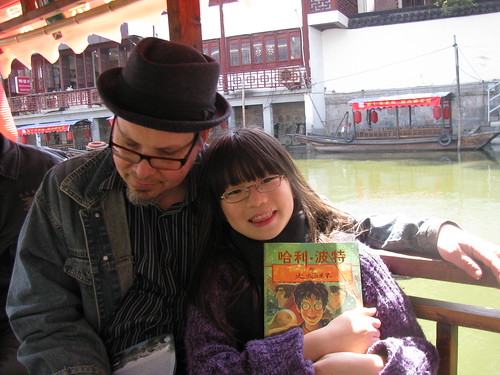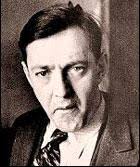|
|
Monday, September 15th, 2008
As so often happens, I find myself confused about church teaching. (It is not my church, but I always seem to understand Christianity less well than I think I do or think I should.) Near the beginning of Death with Interruptions, the prime minister gives a pompous and meaningless speech which ends with an invocation of God: "We will accept the body's immortality, he exclaimed in exalted tones, if that is the will of god, to whom we will always offer our grateful prayers for having chosen the good people of this country as his instrument." A little bit later, the Cardinal phones him, quite angry at his implication that God would will the destruction of the body: "You admitted the possibility that the immortality of the body might be the will of god, and one doesn't need a doctorate in transcendental logic to realize that it comes down to the same thing." I've got to be missing something here; everything I've taken away from reading about Christianity suggests that it's a fundamental tenet, that God wills the destruction of flesh in general and that God willed his own demise in the particular case of the crucifixion. So I'm kind of struggling here to figure out what Saramago has in mind.
 Update: Thanks to correspondence with badger and his friend Bill, I am starting to see the error of my ways. Bill identifies my statement that "God wills the destruction of flesh in general and that God willed his own demise in the particular case of the crucifixion" as Gnostic doctrine, not Christian. I think I'm fundamentally confused about the nature of death in Christian thinking -- I was building off the statement that "to dust you shall return" to get that God was willing the destruction of flesh; but apparently the doctrine of eventual Reincarnation means that the flesh is not destroyed. (I thought when the Cardinal said "without death there can be no resurrection" that he was referring to Christ's resurrection but now it seems like he was talking about the end-times resurrection of the faithful, something that was totally slipping my mind before.) Bill also notes that "Knowing Saramago, though, he's not above having ecclesiastical figures
spout nonsense."
posted evening of September 15th, 2008: Respond
➳ More posts about Death with Interruptions
|  |
|
Guess what the mailman just dropped through the hole in my front door? It is José Saramago's newly* translated Death with Interruptions. Happy! I have been reading a couple of posts over the last few days where people name D.F. Wallace as their favorite (sadly no longer) living author, which sort of thing always makes me wonder whether I have an identifiable favorite; and I think right at the moment, the answer is clearly yes, and that my favorite living author is Saramago. My tastes change of course; I had never even read any Saramago before last winter, so he is a recently acquired favorite. Perhaps this time next year I will have found a new fad. But for the moment I feel pretty strongly about specifying him as the living writer who speaks most directly to me. My tastes change of course; I had never even read any Saramago before last winter, so he is a recently acquired favorite. Perhaps this time next year I will have found a new fad. But for the moment I feel pretty strongly about specifying him as the living writer who speaks most directly to me. Before I even open the covers: this is a beautiful volume. Love the black field, the ghostly moth. The epigraph is from Wittgenstein; I don't know where it is taken from and Google is not helping me, presumably because of translation issues: If, for example, you were to think more deeply about death, it would be truly strange if, in so doing, you did not encounter new images, new linguistic fields. This is making me flash on the discussion of Wallace over the past few days, but possibly just because I've got Wallace on the brain... There is another epigraph, from the Book of Predictions: "We will know less and less what it means to be human." I'm not sure if this is a reference to The Book of Predictions published in 1980 (which I've never heard of before just now), or something else, perhaps something internal to the story. In any case it sounds like a valid prediction. Well it's getting to be a long post about a book which I have not even started reading. I will close with the opening sentence of the story: The following day, no one died.
 *I actually think it was translated about 6 months ago and published in the UK, under the title Death at Intervals; but it is just this week available in the US. I'm assuming the two editions must be pretty similar outside the titles.
posted evening of September 15th, 2008: 3 responses
➳ More posts about José Saramago
|  |
|
In the video that A White Bear linked yesterday, Mark Leyner is asked his thoughts about the audience he's writing for; he responds to the effect that he does not think about audience at all -- writing for him is an obsessive activity like chess for Bobby Fischer, with no object other than the text. David Foster Wallace takes exception to this:
Sometimes it's an act of communication. What makes the analogy ok but also makes it break down, is that
part of the Fischer-like obsession Mark's talking about consists in a kind of mental and emotional dance
with a constructed reader that you figure has a life more or less like yours, and whom in a weird way
you're talking to. Again, I'm like totally with you about 50% of it; the thing about it is that the
light and fun and all that stuff is definitely, that's part of what makes art magical for me; but there's
another part. There's the part -- and I'm afraid I'm going to sound like a puritan or a critic -- but there's
this part that makes you feel full. This part that is redemptive and instructive, where when you read something,
it's not just about -- you go "My God, that's me!" you know, "I've lived like that, I've felt like that, I'm
not alone in the world..."
I felt excited listening to Wallace saying this because it matches up with some things I have been thinking about since last year, specifically to describe my experience of reading Pamuk and more broadly as a way of talking about art in general -- I wrote a brief note about this last November. A White Bear says, Wallace is grasping to understand the possibilities of art as transformational, connective tissue between all these lonely people. For most 20th-c writers, that possibility is a sentimentality that died out around the time that Romanticism did. I want to find out more about this idea in a Romantic context. Were Romantic authors making this argument explicitly or is it something critics read into their work -- or is it an argument made by Romantic critics? And which ones? It's an argument I've been grasping around at for a while and it would be really useful to hear it from someone else's mouth.
 Update: and I guess obviously, duh, this is a strong sign that I should read Wallace's essays and criticism. Will get right on that.
posted morning of September 15th, 2008: Respond
➳ More posts about David Foster Wallace
|  |
Sunday, September 14th, 2008
David Foster Wallace hanged himself on Friday. I am sorry to hear that. Infinite Jest was sort of a late formative experience for me -- I mean I must have been 26 or 27 when I read it, and already pretty well acquainted with reading novels; but it seems like it opened some new windows for me into what writing can do. I have always meant to read more of his work but never gotten to it; now when I do, I will be reading the work of a dead man, work which is part of the history of literature.
 SEK has more at The Edge of the American West. In comments, politicalfootball links to this Charlie Rose interview. Ellen sends along a link to Wallace's commencement speech to the 2005 class at Kenyon. Worship power, you will end up feeling weak and afraid, and you will need ever more power over others to numb you to your own fear. Worship your intellect, being seen as smart, you will end up feeling stupid, a fraud, always on the verge of being found out. But the insidious thing about these forms of worship is not that they're evil or sinful, it's that they're unconscious. They are default settings. A White Bear is not yet ready to grieve. Mark Sussman has lost his favorite living author, and writes very convincingly about why he likes Wallace's work so much. Scott Esposito recommends we "Forget the obituaries and read the man's writing." At The Great Whatsit, Dorothy Gale writes about imagining what Wallace's last Friday might have been like. Andy Whitman feels like he's lost a friend. At This Recording, Meredith Gage considers Wallace in the context of marketing and advertising, and links to many more remembrances.
posted morning of September 14th, 2008: Respond
➳ More posts about Readings
|  |
Saturday, September 13th, 2008
Sylvia and I went to an FCC event on Long Island this morning -- one of the members organized a fishing trip, we figured it would be worth getting up early and driving out there, to meet up with Ron and Nadia. So we were out of bed at 5 this morning, and drove out to Captree State Park to board the good ship Capt. Eddie B. III. So we were out of bed at 5 this morning, and drove out to Captree State Park to board the good ship Capt. Eddie B. III. Lots of other little kids and parents were on board, including Ron and Nadia; we weighed anchor at 8 and motored over to the tip of the island. Sylvia and Nadia were interested in the fishing about half the time, and otherwise in running around the ship. Sylvia caught a baby bluefish and threw it back, I caught a couple of baby bass and a very energetic snapper, all of whom returned to the water. It was a pretty good time.
posted evening of September 13th, 2008: Respond
➳ More posts about Sylvia
|  |
Friday, September 12th, 2008
 Samuel Beckett's Film (1965), featuring Buster Keaton as O, has been uploaded to YouTube by user richardhead. It is too long for a single video but I've created a playlist so you can watch the whole thing sequentially. Beckett called his production "an interesting failure"; Times critic Dilys Powell called it "a load of old bosh." Katherine Waugh and Fergus Daly wrote a celebration of Film's 30th anniversary for the Spring 1995 issue of Film West, "Ireland's film quarterly." Samuel Beckett's Film (1965), featuring Buster Keaton as O, has been uploaded to YouTube by user richardhead. It is too long for a single video but I've created a playlist so you can watch the whole thing sequentially. Beckett called his production "an interesting failure"; Times critic Dilys Powell called it "a load of old bosh." Katherine Waugh and Fergus Daly wrote a celebration of Film's 30th anniversary for the Spring 1995 issue of Film West, "Ireland's film quarterly."
posted morning of September 12th, 2008: Respond
➳ More posts about Pretty Pictures
|  |
Thursday, September 11th, 2008
Kathy's inaugural post at The Edge of the American West makes me wonder how much of the relevant history Sylvia knows about. I don't believe we've talked about it at any length with her; but she has made references to it. Maybe we should go over it some, she's getting old enough. (The events took place just a few days after we had come home from China.)
Not sure if it's a coincidence or what; but on this day, on this date, I find myself wanting to post some tower imagery. Below the fold for more.
posted afternoon of September 11th, 2008: Respond
➳ More posts about M.C. Escher
|  |
Wednesday, September 10th, 2008
Ellen's article about our bathroom renovation(s) is out, in today's Star-Ledger. With nice pictures of the rooms, and a lovely picture of Ellen and Sylvia.
posted evening of September 10th, 2008: Respond
➳ More posts about Bathroom Renovation
|  |
|
So some people at my company are using Lucene as part of a document retrieval system they're building -- I have interacted with them some and had formed the impression that it was sort of a database product, vaguely like MySql but with more fully featured searching. But now I'm learning a little more about it and am very impressed -- it makes searching totally independent of data storage. This seems like a fantastic idea, I'm really looking forward to learning more about it.
posted evening of September 10th, 2008: Respond
➳ More posts about Programming
|  |
|
I've written up my summary of the story of Queipo de Llano's conquest of Seville -- you can read it over at History Time.
posted afternoon of September 10th, 2008: Respond
➳ More posts about The Passionate War
| Previous posts
Archives  | |
|
Drop me a line! or, sign my Guestbook.
•
Check out Ellen's writing at Patch.com.
| |







 My tastes change of course; I had never even read any Saramago before last winter, so he is a recently acquired favorite. Perhaps this time next year I will have found a new fad. But for the moment I feel pretty strongly about specifying him as the living writer who speaks most directly to me.
My tastes change of course; I had never even read any Saramago before last winter, so he is a recently acquired favorite. Perhaps this time next year I will have found a new fad. But for the moment I feel pretty strongly about specifying him as the living writer who speaks most directly to me.




 So we were out of bed at 5 this morning, and drove out to
So we were out of bed at 5 this morning, and drove out to 









 where
where 